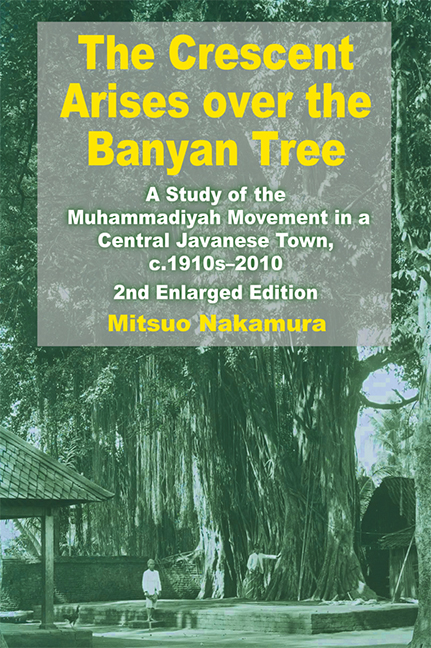 The Crescent Arises over the Banyan Tree
The Crescent Arises over the Banyan Tree Book contents
- Frontmatter
- Dedication
- Epigraph
- Contents
- List of Figures and Maps
- List of Tables
- List of Boxes
- Foreword to the Second Edition
- Preface to the Second Edition
- Foreword to the First Edition
- Preface to the First Edition
- Notes
- Map
- PART I DEVELOPMENT OF THE MUHAMMADIYAH IN KOTAGEDE, c.1910s–1972
- 1 Introduction: The Islamization of Java
- 2 Kotagede under the Banyan Tree: Traditional Society and Religion
- 3 The Beginning of the Muhammadiyah: Court Religious Officials and the Urban Middle Class
- 4 The Development of the Muhammadiyah: Religion and Social Action
- 5 The Sociology of Ummat Islam: Structure and Anti-Structure
- 6 The Ideology of the Muhammadiyah: Tradition and Transformation
- 7 Conclusion: Re-Islamization of Java
- Postscript to Part I
- PART II KOTAGEDE REVISITED, 1972–2010
- Bibliography
- Glossary
- Appendices
- Index
- About the Author
4 - The Development of the Muhammadiyah: Religion and Social Action
from PART I - DEVELOPMENT OF THE MUHAMMADIYAH IN KOTAGEDE, c.1910s–1972
Published online by Cambridge University Press: 21 October 2015
- Frontmatter
- Dedication
- Epigraph
- Contents
- List of Figures and Maps
- List of Tables
- List of Boxes
- Foreword to the Second Edition
- Preface to the Second Edition
- Foreword to the First Edition
- Preface to the First Edition
- Notes
- Map
- PART I DEVELOPMENT OF THE MUHAMMADIYAH IN KOTAGEDE, c.1910s–1972
- 1 Introduction: The Islamization of Java
- 2 Kotagede under the Banyan Tree: Traditional Society and Religion
- 3 The Beginning of the Muhammadiyah: Court Religious Officials and the Urban Middle Class
- 4 The Development of the Muhammadiyah: Religion and Social Action
- 5 The Sociology of Ummat Islam: Structure and Anti-Structure
- 6 The Ideology of the Muhammadiyah: Tradition and Transformation
- 7 Conclusion: Re-Islamization of Java
- Postscript to Part I
- PART II KOTAGEDE REVISITED, 1972–2010
- Bibliography
- Glossary
- Appendices
- Index
- About the Author
Summary
Less talk, more work! (Sedikit bicara, banyak bekerja!)
(A Muhammadiyah motto)One of the ways of understanding the process of the Muhammadiyah development in Kotagede seems to be to take a look at the life histories of its founding leaders. For, in the life histories of those individuals, the transition to a new religious and social orientation is clearly embodied. The life histories of two such individuals, Kyai Haji Masjhudi and Kyai Haji Amir,1 shall be presented below in detail. Both were the founders of the Kotagede Muhammadiyah. In addition, for the purpose of generalization and comparison, mention shall be made of some other individuals.
MUHAMMADIYAH FOUNDERS IN KOTA GEDE
Haji Masjhudi was born in Kampung Boharen, Kotagede in 1888. His childhood name was Rusdi but he later changed it to Masjhudi upon his return from the Mecca pilgrimage. The exact date of his birth is not known. He told me: “My birth date is not certain, for there is no written document.” When asked if he remembered his birthday according to the Javanese calendar, he answered: “I've already forgotten it. It's not important.” It is likely that he did know it, but obviously he did not seem to think much of it. When he died on 28 February 1972, while I was still in the town, a biographical sketch was compiled by the Muhammadiyah leaders of Kotagede and read at his funeral:2 according to this source, the haji was 84 years old at his death. The description of his life, which follows, is based upon this biographical sketch, other local publications, and the interviews I had with him, his family members and friends.
Haji Mukmin, Haji Masjhudi's father, was a wholesale trader in cotton goods and cloth for batik. He had a store in Danuredjan, one of the main business districts in the city of Yogyakarta. Mukmin's grandfather, Kyai Baghowi, came to settle in Kotagede from the Kauman district of Pijenan in Bantul prior to the Dipanegara War (1825–30). Haji Mukmin's father was called Kyai Sjafi'i. Haji Masjhudi was thus the fourth generation of a family migrated from the hinterland of Kotagede, but he, and others, thought himself to be Kotagede asli, “a native Kotagedean”.
- Type
- Chapter
- Information
- The Crescent Arises over the Banyan TreeA Study of the Muhammadiyah Movement in a Central Javanese Town, c.1910s-2010 (Second Enlarged Edition), pp. 78 - 118Publisher: ISEAS–Yusof Ishak InstitutePrint publication year: 2012
